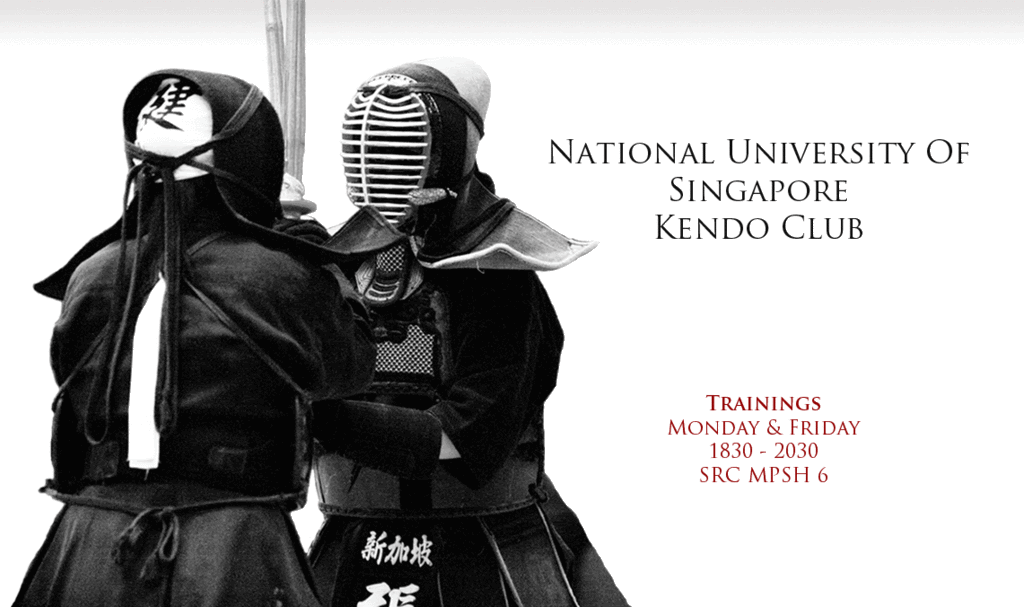Why Kendo?
By Belinda
On Wednesday, 12th May 2010, the current members of NUSKC gathered for their Annual General Meeting. As we applaud the outgoing executive committee for all the hard work that they have put into the club, we also gathered to vote in our newest exco!

Back row, from left to right:
Pheng Hui (SLOAM), Wei Lun (Logistics),
Belinda (Publicity/IT), Kenneth (Welfare) and Benjamin (Treasurer)
Front row, from left to right:
Weber (Vice-Captain), Yong He (Captain),
Chee Fung (President) and Maureen (Vice-President)
As the club grew through the years, our members have come and gone--but not without leaving a part of their legacy behind. Each one of us joined the club for our individual reason, and during our stay, we will each bring in something different to the club, ensuring it stays dynamic always.
So now, while the new committee embarks on their mission to bring the club to greater heights, let's ask some of them this:
Why Kendo?
Let's take a look back at why we first decided to sign up...and why we've stayed on since. :)

"I came to know about kendo after accidentally stumbling across a website on the web. I got interested in it and finally found a chance to learn more about it during the matriculation fair. After a short enquiry with the seniors at the kendo booth, I soon found myself jotting down my name on the contact list. The rest as they say is history. I guess the key thing that attracted me to kendo was its strong attachment to the ancient warriors of Japan, the samurai.
After joining the club, I've learnt a lot about myself. For me, kendo not only allowed me to learn techniques that is very close to swordsmanship but also more importantly enabled me to explore and learn more about myself. Of course, the training is no walk in the park but only through sincere and tough training can one truly begin to understand one's limits both physically and mentally. It is primarily this constant curiosity about myself that drove me and motivated me to persist on in kendo."
-- Yong He

"It is more than a martial art. Apart from being physically and mentally challenging, it comes together with values and etiquette."
-- Weber

"Firstly, I will say that Kendo is tough, honestly. But to me, this is what keeps me in Kendo. Each time you managed to ‘survive’ the training and finally take off the men (helmet), that feeling of cold air blowing onto your face is very satisfying, especially after a hard training. It gives you an unprecedented sense of achievement.
Kendo doesn’t simply just train one’s physical capabilities and endurance. Kendo also incorporates the training of the mind. It teaches one discipline, focus, spirit and endurance. I have not only learned about the martial art form, but also a lot about life from Kendo.
Lastly, the strong bonds that are formed--with fellow kendokas who you've endured tough trainings together with--will stick with you throughout life forever."
--Kenneth
Finally, the incoming committee would like to share a few words:
"Kendo is a form of martial arts from Japan. Its origins could
be traced back to the era of the samurai. As such, kendo is differentiated from
the other forms of martial arts by having a strong link with the ancient heritage of the samurai and bushido. Therefore, in kendo, the values of budo are as treasured as the techniques that were passed down through centuries.
In order to hold on to these values, the NUS Kendo Club believes in the holistic development of each kendoka. By “holistic development”, we mean the development of not just the technical skills of a kendo practitioner, but also his/her development as a person.
There are several key components of kendo namely, kihon (fundamentals), shiai (competition) and shinsa (grading). Each of these components is
essential to a kendo practioner. That is the reason why our club has placed
equal emphasis on all these components.
The Club envisions itself to become a club that provides the necessary environment for its members to improve both as a kendo practitioner and a person. Our club will strive hard to achieve this goal and will continue to do so in many years to come. We sincerely invite all who are interested in their personal growth in kendo, and even in life to join us in this endeavor.
Why Kendo? Why not!"






























